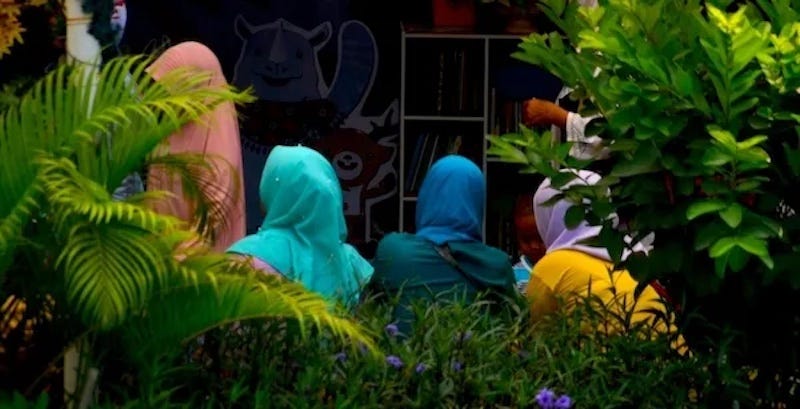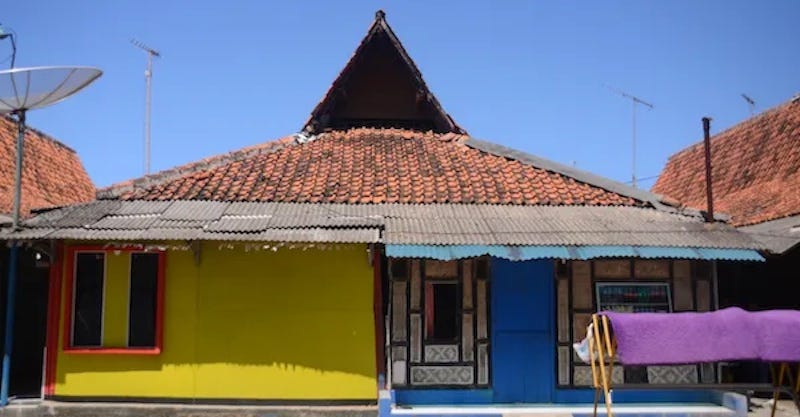Fifty Metres Away from the Beating Waves of the Indian Ocean
Two Carbonated Alcoholic Drinks, a Hair-Grooming Ritual, Important, Hyperactive and Randomly Dressed Priaks and Calm, Accepting and Proudly Dressed Wanitas
These towering letters greet Indonesian holidaymakers at Java’s largest seaside resort. Beyond the bold red letters, depending on the time of day, you’ll encounter different scenes from the world of crashing waves:
The music is by:
Stavroz, a Belgian band known for their unique blend of acoustic and electronic music.
Nym, a one-man project from Fairbanks, Alaska that combines audio samples, live recordings, and organically generated electronic sounds to craft introspective and cinematic tracks.
Today’s post continues from:
The midday heat drapes itself heavily over everything around. I’m on the beach with my firstborn sun, thinking that with a single word swap in Noël Coward’s ”Mad Dogs and Englishmen Go Out in the Midday Sun,” a more fitting song would emerge on this beautiful mid-August day in Pangandaran—Mad Dogs and Polishmen Go out in the Midday Sun.
Now, proving the wisdom of each generation surpassing the last, Michał has abandoned the beach, leaving me alone with the bubbly waves that lure belly surfers to Pangandaran’s sun-bleached shores. Meanwhile, the local beach vendors, reclining in hammocks under the palm-tree shade, have ample time to cast puzzled glances at my midday rendezvous with that great dispenser of life-giving—and undeniably calorific and carcinogenic—energy.
It’s almost 1.p.m., and I’ve finally collapsed in the shade of a makeshift beachside eatery. Even flies seem to have surrendered, because they’ve now stopped their buzzing raids around my head and settled down on the table, twitching lazily in the oppressive warmth. The world around is melting into a sluggish, sun-soaked, shimmering stupor.
The woman in charge of this place is slowly nibbling on sticky rice in a bright yellow plastic bowl, while her daughter is intensely focused molding pink, rubbery plasticine. These vibrant objects breathe a little life into the otherwise shabby surroundings. Meanwhile, the grandmother, having just pocketed the equivalent of five meals from a wet, panting foreigner in exchange for a carbonated alcoholic drink, has decided she’s earned her rest. She’s now stretched out for an afternoon nap right before my eyes in the very middle of the kitchen-dining area. These people are so relaxed—like my cats.
Now, the mother has started something I’ve noticed everywhere in Sumatra and Western Java: the hair-grooming ritual. It feels like, no matter where you are, people are constantly tending to each other’s hair. Mothers and grandmothers gently comb through their children’s locks, but also children return the favour to their elders. Also, wives, with meticulous focus, check their husbands' heads for lice, which leaves me wondering whether the husbands ever reciprocate? I’ve never witnessed that last part, and I suspect I probably never will!
I can almost hear David Attenborough, lying prone on the jungle floor nearby, whispering in his signature tone: “… primates [Attenborough’s signature pause] that are lower on the social ladder may initiate grooming with a higher ranked primate in order to increase their position. [Another pause] Mutual grooming typically describes the act of grooming between two individuals, often as a part of social grooming, pair bonding, or a precoital activity.”*
I find myself a little envious of this effortless, natural guarantee of daily intimacy. There are no maybe-not-today-darling-I-have-a-headache excuses. None of that! Instead, there is a daily ritual to perform on your darling’s head, and there is daily contact. In this way, the unassuming parasitic wingless insects of the order Psocodea unwittingly succeed in bonding Muslim families—families often unnecessarily torn between the desire for closeness and the culturally imposed divide into the world of important, hyperactive and haphazardly dressed priaks
and the world of calm, accepting and proudly dressed wanitas.
Having left the laid-back cluster human she-cats behind, I find myself doubly tempted to another place down the road. A large bottle of Panther Stout Rich and Smooth gleams invitingly in the window, while a procession of pastel-coloured hijabs drifts inside, one by one, like a soft midday breeze. I follow them in.
After the first sip, I realise that the Panther lives up to its promise—stout, incredibly rich, and perfectly smooth. Who knows, by the time I empty this XL bottle, Pangandaran may soon witness a not-so-stout Pink Panther smoothly gliding on the wild crests of its legendary surf!
Meanwhile, the pastel hijabs I passed at the entrance have blossomed into a lively congregation, comfortably sprawled on the tiled floor at the back of the Panther’s den. They rattle off neighbourhood gossip, their laugher echoing like melodic chimes through the tiled interior, as they pick at snacks scattered across the floor. It’s an intimate world of laid-back sisterhood, one that feels sacred and off-limits to me. I can only imagine how the return of their tastelessly clad knights might alter this gathering. Would their carefree ease waver, or would their camaraderie remain untouched?
Hadi Hendri Hermanto, Dian Tri Kartawijaya or Wibawa Benny Budiman rise early each morning, stepping into the male-dominated arena along the beachfront. In the oceanside jungle of the never-ending hunt for the attention of holidaymakers, natural selection is operational around the clock, and on multiple fronts.
The number of hawkers, rickshaw drivers and eager salesmen offering beach equipment significantly exceeds the pool of potential customers. To complicate matters, everything except beer and wine is incredibly cheap, making it challenging to justify the long, almost round-the-clock patrols needed to sell items that, even if they do find a buyer, yield a meagre daily profit of one to ten dollars.
What are their business plans? How do these weary yet hard-working people maintain their boundless patience and ever-present smiles? What makes them tick? And why do so many of us modern, affluent homo economicus** struggle to tap into our inner homo ludens*** in our daily lives?
* Wikipedia.
** Homo economicus is a theoretical concept in economics that describes an idealised human being who is perfectly rational, self-interested, and seeks to maximize utility or profit in decision-making.
*** Homo ludens is a concept that refers to the human being as a "playing man." It emphasises the importance of play, creativity, and leisure in human culture and society. The term was popularised by the Dutch historian Johan Huizinga in his 1938 book, Homo Ludens: A Study of the Play Element in Culture.
By the way, yesterday morning, when listening to The Ginning by Stavroz, I checked the meaning of its title:
Ginning is the process of removing the seeds and debris from cotton. The term comes from the cotton gin, invented by Eli Whitney in 1794. In modern ginning, the cotton is first dried to remove moisture, then cleaned to remove any burs, stems, leaves, or other foreign matter (https://www.heddels.com/dictionary/ginning).
Removing the seeds and debris from cotton does sound a bit that the hair-grooming ritual, doesn’t it? Not to mention the American slang meaning of the term ginned:
drunk; intoxicated; inebriated (https://www.collinsdictionary.com/dictionary/english/ginned)
It does sound like two XL bottles of a carbonated alcoholic drink known to few as Panther Stout Rich and Smooth, doesn’t it? However, none of it was intended. I just love the relaxed vibe of the song whenever I’m under the scorching sun and around beating waves.
Next week’s post will be about a Tale from the Jungle. And remember my dear subscriber that whatever’s been published before, can be found in the archives. Also, if you can’t find our post on a Monday, don’t think that Nova Literary has forgotten about you. No, never! Check your Spam, Social or Promotions inbox tabs and we’ll surely be there…












